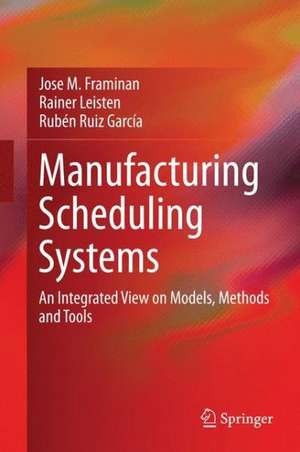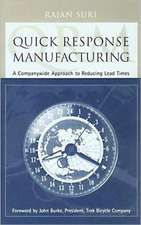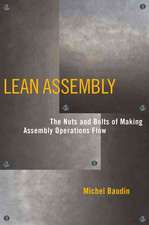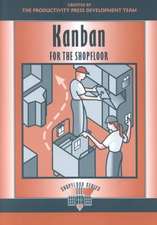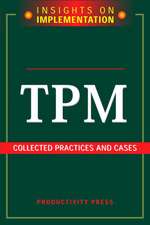Manufacturing Scheduling Systems: An Integrated View on Models, Methods and Tools
Autor Jose M. Framinan, Rainer Leisten, Rubén Ruiz Garcíaen Limba Engleză Hardback – 6 mar 2014
"Manufacturing Scheduling Systems: An Integrated View on Models, Methods and Tools" presents the different elements constituting a scheduling system, along with an analysis the manufacturing context in which the scheduling system is to be developed. Examples and case studies from real implementations of scheduling systems are presented in order to drive the presentation of the theoretical insights. The book is intended for an ample readership including industrial engineering/operations post-graduate students and researchers, business managers, and readers seeking an introduction to the field.
| Toate formatele și edițiile | Preț | Express |
|---|---|---|
| Paperback (1) | 1113.71 lei 6-8 săpt. | |
| SPRINGER LONDON – 2 sep 2016 | 1113.71 lei 6-8 săpt. | |
| Hardback (1) | 1119.87 lei 6-8 săpt. | |
| SPRINGER LONDON – 6 mar 2014 | 1119.87 lei 6-8 săpt. |
Preț: 1119.87 lei
Preț vechi: 1365.69 lei
-18% Nou
Puncte Express: 1680
Preț estimativ în valută:
214.31€ • 223.46$ • 178.11£
214.31€ • 223.46$ • 178.11£
Carte tipărită la comandă
Livrare economică 21 martie-04 aprilie
Preluare comenzi: 021 569.72.76
Specificații
ISBN-13: 9781447162711
ISBN-10: 1447162714
Pagini: 420
Ilustrații: XVIII, 400 p. 106 illus., 51 illus. in color.
Dimensiuni: 155 x 235 x 28 mm
Greutate: 0.76 kg
Ediția:2014
Editura: SPRINGER LONDON
Colecția Springer
Locul publicării:London, United Kingdom
ISBN-10: 1447162714
Pagini: 420
Ilustrații: XVIII, 400 p. 106 illus., 51 illus. in color.
Dimensiuni: 155 x 235 x 28 mm
Greutate: 0.76 kg
Ediția:2014
Editura: SPRINGER LONDON
Colecția Springer
Locul publicării:London, United Kingdom
Public țintă
ResearchDescriere
Manufacturing Scheduling Systems offers a comprehensive and integrated perspective on the different aspects required to design and implement systems to efficiently and effectively support manufacturing scheduling decisions. The different elements constituting a scheduling system are presented, along with an analysis of the manufacturing context in which the scheduling system is to be developed. Examples and case studies from real implementations of scheduling systems are presented to support the theoretical insights.
Manufacturing Scheduling Systems provides an overview of scheduling ‘hot topics’, resulting in a text of high appeal to a broad readership from postgraduate students in industrial engineering/operations research and business management, to practitioners in the field.
Manufacturing Scheduling Systems provides an overview of scheduling ‘hot topics’, resulting in a text of high appeal to a broad readership from postgraduate students in industrial engineering/operations research and business management, to practitioners in the field.
Cuprins
Part I: Introduction and Context
Introduction to Manufacturing Scheduling
Manufacturing Scheduling in Context
Part II: Scheduling Models
Introduction to Scheduling Models
Scheduling Constraints
Objectives
Part III: Scheduling Methods
Overview of Scheduling Methods
Exact Procedures
Approximate Methods
Multiobjective Scheduling
Part IV: Scheduling Tools
Introduction to Scheduling Tools
Advanced Design of Scheduling Tools
Part V: Scheduling Systems
Overview of Scheduling Systems
A Roadmap for Developing Scheduling Systems
Case Studies
Introduction to Manufacturing Scheduling
Manufacturing Scheduling in Context
Part II: Scheduling Models
Introduction to Scheduling Models
Scheduling Constraints
Objectives
Part III: Scheduling Methods
Overview of Scheduling Methods
Exact Procedures
Approximate Methods
Multiobjective Scheduling
Part IV: Scheduling Tools
Introduction to Scheduling Tools
Advanced Design of Scheduling Tools
Part V: Scheduling Systems
Overview of Scheduling Systems
A Roadmap for Developing Scheduling Systems
Case Studies
Notă biografică
Jose M Framinan is an Industrial Engineer and is currently Professor and Head of the Industrial Engineering and Business Management Department in the University of Seville. His research interests refer to decision systems and models in industry and services, including a range of decisions related to the design and optimization of processes, production and supply chain planning and scheduling. In these areas, he has worked intensively on both public-and privately- funded research projects along an 18-year time span, producing over 50 refereed contributions. He has been scientific advisor for a number of international (mostly European and American) research institutions. In addition, he serves in the editorial board of several journals in the domain of Industrial Engineering and Operations Research.
Professor Rainer Leisten holds a Master degree (former German Diploma degree) in Mathematics and a PhD in Industrial Management (Business Administration) from the University of Cologne. He also has professional experience as a controller in the financial industry. He received his Habilitation degree (German post-doc degree) from the University of Heidelberg and was Professor in Business Administration and Production Management at the University of Greifswald and at the University of Duisburg. Currently, he is Professor for Business Administration and Operations Management in the Faculty of Engineering of the University of Duisburg-Essen. He published numerous scientific articles in manufacturing scheduling as well as in coordination of complex planning systems and in logistics. His focus on Industrial Engineering led to numerous projects, both on the national and the international level and both with other researchers and companies.
Professor Rubén Ruiz holds a PhD in statistics and Operations Research from the Universitat Politècnica de València where he is currently a professor. He has worked in the last 12 years in production planning and scheduling and has published more than 40 articles in international journals. He is co-editor of the “European Journal of Industrial Engineering” international journal and associate editor or member of the editorial board of many prestigious journals. Apart from his academic life, Professor Ruiz has completed more than 30 R+D projects with different companies of several industrial sectors related with production planning, scheduling and logistics. He is currently director of the Applied Optimization Systems Group at the Institute of Informatics where he is closely working with companies, students and colleagues.
Professor Rainer Leisten holds a Master degree (former German Diploma degree) in Mathematics and a PhD in Industrial Management (Business Administration) from the University of Cologne. He also has professional experience as a controller in the financial industry. He received his Habilitation degree (German post-doc degree) from the University of Heidelberg and was Professor in Business Administration and Production Management at the University of Greifswald and at the University of Duisburg. Currently, he is Professor for Business Administration and Operations Management in the Faculty of Engineering of the University of Duisburg-Essen. He published numerous scientific articles in manufacturing scheduling as well as in coordination of complex planning systems and in logistics. His focus on Industrial Engineering led to numerous projects, both on the national and the international level and both with other researchers and companies.
Professor Rubén Ruiz holds a PhD in statistics and Operations Research from the Universitat Politècnica de València where he is currently a professor. He has worked in the last 12 years in production planning and scheduling and has published more than 40 articles in international journals. He is co-editor of the “European Journal of Industrial Engineering” international journal and associate editor or member of the editorial board of many prestigious journals. Apart from his academic life, Professor Ruiz has completed more than 30 R+D projects with different companies of several industrial sectors related with production planning, scheduling and logistics. He is currently director of the Applied Optimization Systems Group at the Institute of Informatics where he is closely working with companies, students and colleagues.
Textul de pe ultima copertă
The book is devoted to the problem of manufacturing scheduling, which is the efficient allocation of jobs (orders) over machines (resources) in a manufacturing facility. It offers a comprehensive and integrated perspective on the different aspects required to design and implement systems to efficiently and effectively support manufacturing scheduling decisions. Obtaining economic and reliable schedules constitutes the core of excellence in customer service and efficiency in manufacturing operations. Therefore, scheduling forms an area of vital importance for competition in manufacturing companies. However, only a fraction of scheduling research has been translated into practice, due to several reasons. First, the inherent complexity of scheduling has led to an excessively fragmented field in which different sub problems and issues are treated in an independent manner as goals themselves, therefore lacking a unifying view of the scheduling problem. Furthermore, mathematical brilliance and elegance has sometimes taken preference over practical, general purpose, hands-on approaches when dealing with these problems. Moreover, the paucity of research on implementation issues in scheduling has restricted translation of valuable research insights into industry.
Manufacturing Scheduling Systems: An Integrated View on Models, Methods and Tools presents the different elements constituting a scheduling system, along with an analysis the manufacturing context in which the scheduling system is to be developed. Examples and case studies from real implementations of scheduling systems are presented in order to drive the presentation of the theoretical insights. The book is intended for an ample readership including industrial engineering/operations post-graduate students and researchers, business managers, and readers seeking an introduction to the field.
Manufacturing Scheduling Systems: An Integrated View on Models, Methods and Tools presents the different elements constituting a scheduling system, along with an analysis the manufacturing context in which the scheduling system is to be developed. Examples and case studies from real implementations of scheduling systems are presented in order to drive the presentation of the theoretical insights. The book is intended for an ample readership including industrial engineering/operations post-graduate students and researchers, business managers, and readers seeking an introduction to the field.
Caracteristici
Integrates different elements of a fragmented field in order to provide a new perspective on manufacturing scheduling
Exemplified by case studies from real implementations of scheduling systems
Accessible to a wide readership including students, researchers and professionals
Includes supplementary material: sn.pub/extras
Exemplified by case studies from real implementations of scheduling systems
Accessible to a wide readership including students, researchers and professionals
Includes supplementary material: sn.pub/extras
